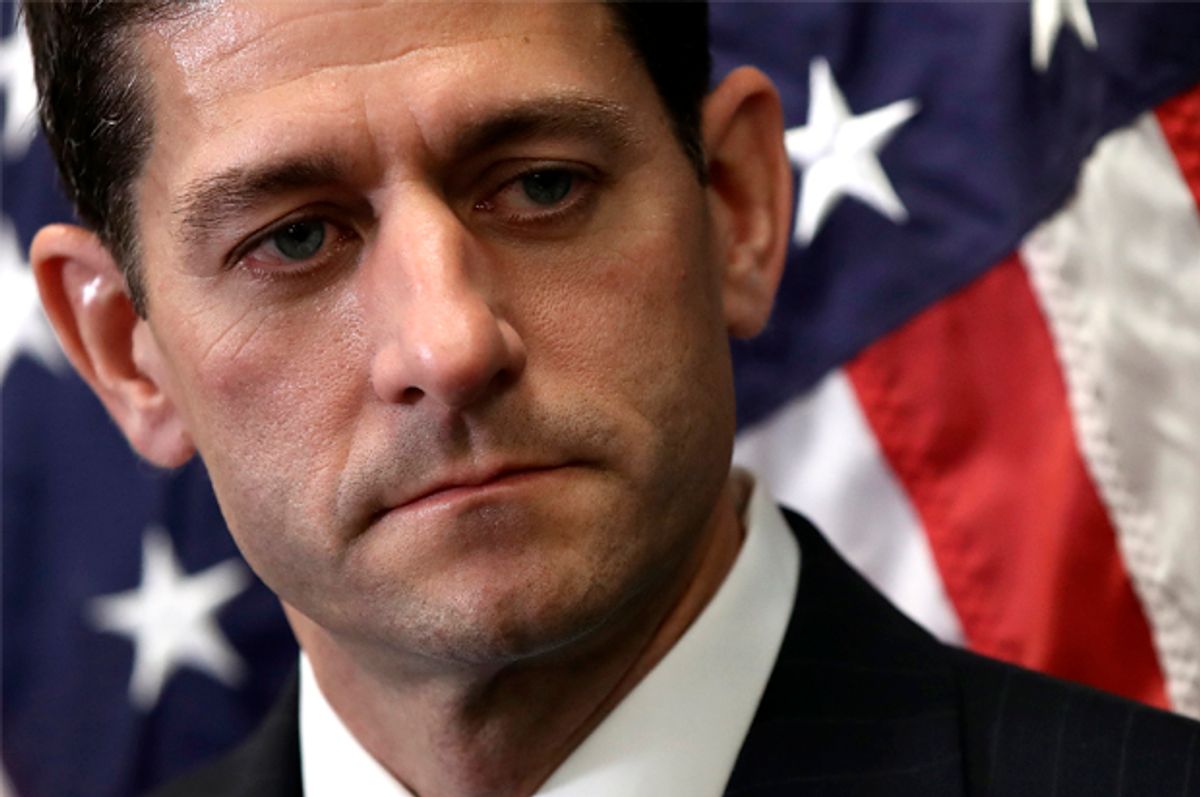Poor, poor Paul Ryan.
Just about a year ago, the policy wonk with the sad puppy-dog eyes agreed to take the job of speaker of the House. In his new role, he would be overseeing a fractured Republican caucus at war with itself as well as a chamber so calcified by partisan bickering it could barely pass governmental funding bills. Not to mention that the voters of his beloved GOP were about to select a rotting pile of clementine carcasses wearing a suit as the party’s presidential nominee.
Even the most seasoned congressional operator would have a tough time navigating this state of affairs without sliding into existential despair. And as many observers have pointed out, Ryan is anything but a seasoned operator.
A year later, two stories published yesterday have shed some light on how Ryan is doing in his new role. The answer is: not well!
As far as the ability of the House of Representatives to function like a productive legislative body goes, Ryan has been unable to cure the gridlock that drove his predecessor, John Boehner, into a quiet retirement of mowing his lawn and piloting an RV across America like a tobacco-stained Jack Nicholson. As Matt Fuller's Huffington Post piece makes clear, Ryan’s major achievement is that he has made the members of the far-right House Freedom Caucus believe he is at least listening to their concerns while he still has to cut backroom deals with Democrats to move major legislation like funding bills:
If you ask members themselves what the difference is between Ryan and Boehner, responses will range from those who genuinely think the current speaker’s more open lines of communication have made a dramatic difference, to those who will stare at you like you’re crazy to think there’s any change at all. . . .
Ultimately, however, the legislative outcomes that Ryan has produced during his speakership have been no different than those of Boehner, according to conservatives.
Part of the problem here is the dynamic that Ryan has inherited, where the House has become so deeply polarized that it has become nearly impossible to cobble together the bipartisan coalitions the chamber has often depended upon. Any speaker then is torn between many competing sides and always has to choose at least one to disappoint, which Ryan seems incapable of doing.
The Wisconsin congressman has long been a rabid ideologue in sheep’s clothing, presenting himself as a mild-mannered policy nerd while advocating for a far-reaching evisceration of the federal government’s functions that might make even Ayn Rand queasy. Floating in the yawning gap between his vision of a disemboweled national government and his desperation to maintain his public image as a soft-spoken wonk who just wants to make things work, gosh darn it, is the sense that he is biding his time until control of the government aligns in a way that will allow him to bulldoze the welfare state into oblivion.
In other words, everyone knows Ryan is a phony. Which makes it nearly impossible for him to push the House to do anything beyond the bare minimum to keep the government functioning. And he can barely even do that.
Ryan has now attached himself to a presidential candidate who he believes would likely rubber-stamp conservative bills the speaker manages to get through both the House and Senate and onto his desk. The downside is that said candidate is a terrible bigot whose rise has made clear just how very much the Republican Party depends on racism and nativism to maintain whatever electoral power it holds. And this has apparently made Ryan very sad, as reported by McKay Coppins at BuzzFeed:
Each day [Ryan] spends tethered to the Donald seems to bring some fresh humiliation; each role he inhabits in the entourage proves more undignified than the last. Adviser, apologist, hype man, scold — none brings redemption, or even reprieve. And so he trudges on toward November, a stench of sadness clinging to him as he goes.
Those might be the saddest sentences ever written in the history of political journalism.
Sources close to Ryan said he endorsed Trump in June in hopes of gaining access to the candidate’s inner-circle and steering him away from his more destructive behavior. . . . Of course, neither initiative has been particularly successful — and along the way, Ryan has put himself in the deeply degrading position of having to respond to every outrage Trump committed on the campaign trail.
I take it back. Those might be the saddest sentences ever written in political journalism.
What stands out in Coppins’ article, though, is not so much the sadness of Paul Ryan as the sense that the speaker is in over his head. By endorsing and continuing to support Donald Trump, no matter how outlandish the candidate gets, Ryan has lost what little credibility he might once have had with the public and the more credulous members of the political press.
In trying to balance both supporting and scolding his party’s nominee, Ryan has shown that he will sell out any principle to get closer to his dream, no matter how much it might tug at his Catholic conscience. He has exposed himself once and for all as a party hack. And yet, if the sympathetic quotes Coppins obtains from Ryan’s friends are any indication, he is still getting the benefit of the doubt.
Which is why Ryan will likely be fine in the aftermath of Trump’s likely defeat. He should be grateful his party nominated such an obvious con man for the presidency that it still can’t recognize it has another one in charge of the House of Representatives.



Shares